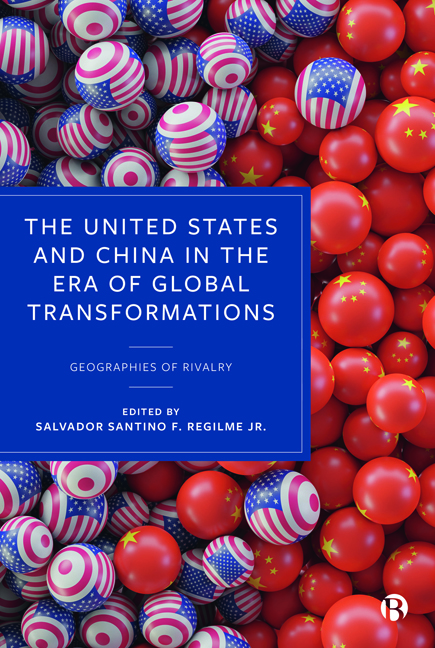1 - Spatial Imaginaries and Geopolitics in US–China Rivalry
Published online by Cambridge University Press: 28 March 2024
Summary
Introduction
Great power rivalry is back once again (Layne 2012; Buzan and Cox 2013; Mearsheimer 2014; Graaff and Van Apeldoorn 2018; Ikenberry 2018a, 2018b; Lake 2018). In the 21st century, post-COVID-19 pandemic world order, China and the US have emerged as the two most powerful state actors, if several quintessential economic, military, and sociocultural indicators are considered. The economic front is indeed an area of great power contestation. According to the World Bank (2022a), while the US in 2021 had the world’s largest gross domestic product (GDP; constant 2015 US dollars [USD]) with 20.3 trillion USD, China recorded 15.8 trillion USD. China’s enormous economic wealth that it has accumulated over the last few decades, however, has to be shared by the country’s 1.4 billion people. China’s 2021 GDP per capita (constant USD for 2015) remains remarkably low at 11,188 USD, compared to the US that has 61,280 USD. Notwithstanding, China has overtaken the US as the world’s largest manufacturer of products that are then exported to all countries. Consequently, China has the largest percentage share of the world’s exports of goods, with 14.7 percent in 2020, while the US only has 8.1 percent (Razo 2021). Nearly 124 countries recorded China as their top trading partner, while the US was recorded as the top exporter in only 56 countries (Arte 2022).
In global financial governance, China challenges US dominance as the former established the Belt and Road Initiative (BRI), the vast rail, land, and sea global network that connects China to a large number of countries in almost all world-regions (Kuo and Kommenda 2018; Nordin and Weissmann 2018; Jones and Zeng 2019). In a bid to stimulate development outcomes elsewhere, China founded the Asian Infrastructure Investment Bank (AIIB), which is a multilateral financial institution that invests in various economic, social, and sustainable development projects in at least 105 member countries (Kubalkova 2015; Babones et al 2020; Lai 2022). China’s BRI and AIIB constitute attempts to upstage the Washington DC-based World Bank and the Manila-based Asian Development Bank, both of which predominantly reflect US interests.
- Type
- Chapter
- Information
- The United States and China in the Era of Global TransformationsGeographies of Rivalry, pp. 3 - 25Publisher: Bristol University PressPrint publication year: 2023



